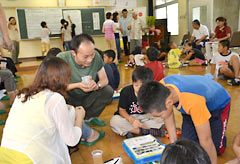Ibis protection group from China visits Kijoka Elementary School

On July 26, at Kijoka Elementary School in Ogimi, project members from China studied the learning outcomes of wild bird-watching.
August 1, 2012 Ryukyu Shimpo
With support from the Japan International Cooperation Agency (JICA), and aiming to deepen understanding of the protection and care for local ibises and wild fowl, 12 members of the Chinese project group for protecting ibises in China visited Kijoka Elementary School in Ogimi on July 26. The school has been involved in bird-watching since 1988 and has also been engaged in activities to preserve the natural environment. The group observed wild birds in the rice fields with the children and studied the results of research.
Seven wild ibis were found in China’s Shaanxi Province in 1981, and the number of ibis has subsequently increased through artificial breeding. From then on, they started to send ibises to Japan.
However, the crop volume in areas where ibises where released decreased because farmers had to limit the use of agrichemicals. For that reason, since 2010 JICA has promoted growing cash crops in order to create an environment in which humans and ibises can coexist.
A member of the project, Kijoka resident Noritaka Ichida, who is a special adviser to Birdlife International has taught local children about bird watching. This stimulated the members of this group from China to come to look at Kijoka to get ideas about protection activities back in China.
The members read observation records and observed wild fowl with children near the school and rice paddies in the area. The school presented the results of their environment education. One member of the group asked if the number of species of birds has increased, to which a school staff member referred to the overall decline in Japan in the number of wild birds, but said, “Thanks to the efforts of farmers the number of species has not decreased here.”
(English translation by T&CT, Lima Tokumori and Mark Ealey)
Previous Article:Worldwide Youth Uchinanchu Festival closes with local festival in Sao Paulo
Next Article:Kinkomokuzetsu: Column Peru in Koza
[Similar Articles]
- Kijoka elementary school children find swan goose
- Chinese Goshawk birds visit Zamami Island
- Migratory birds at pond at Tomigusuku
- Kijoka Elementary School pupils find red-billed starling
- Fields of purple emerge in Ogimi Village
 Webcam(Kokusai Street)
Webcam(Kokusai Street)


